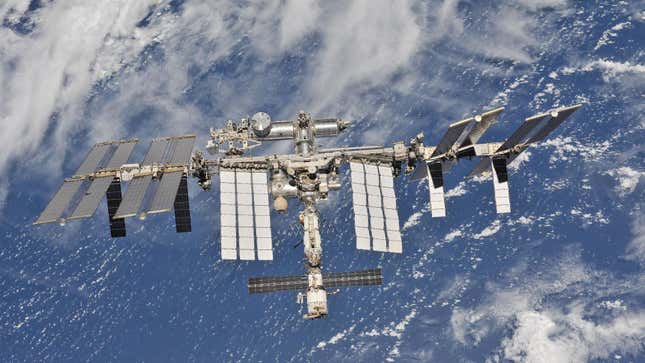
It was a bumpy journey, but Russia’s Nauka module is finally arriving at the International Space Station. You can catch the action live right here.
Update: 9:39 a.m. EDT: Hooks are now closed on both sides of the docking port between Nauka and ISS, so we’ve got a hard mate. Air leaks in the interface will continue for a few hours.
Update: 9:34 a.m. EDT: Docking probe has fully retracted to complete the docking process. Hooks are now driving to complete a hard mate of the newly arrived module.
Update: 9:31 a.m. EDT: Contact and capture, docking of of Nauka module at the ISS confirmed at 9:29 a.m. EDT (13:29 UTC).

Update: 9:03 a.m. EDT: A retrograde maneuver was required to correct a minor “perturbation” in the module’s trajectory, according to NASA.
Original post follows.
Launched on July 21, the Russian Multipurpose Laboratory, or Nauka, ran into some problems shortly after reaching orbit, including a failed initial orbital correction, leading to fears it might fall back to Earth. But Roscosmos worked its way through these problems, performing a final corrective maneuver on July 28, so everything’s set for the module’s arrival at the ISS. Docking of Nauka is scheduled for 9:24 a.m. EDT, with NASA coverage beginning at 8:30 a.m. EDT.
Roscosmos used backup thrusters to make the initial course correction, but issues with an antenna and Nauka’s docking target raised concerns about how those problems might impact the docking attempt.
On July 26, the Russian Pirs module detached from the ISS to make room for the incoming module. Pirs, along with a Progress MS-16 transport cargo vehicle, burned up on re-entry through Earth’s atmosphere.
Nauka, which means “science” in Russian, will provide more room for research experiments, cargo, and equipment. The 43-foot long, 23-ton module features new crew quarters, new life support equipment, and even a new toilet. The module is also delivering the European Robotic Arm (ERA), which after installation will service the Russian segment of the orbital outpost. Also onboard is a new docking port and airlock for future spacewalks.